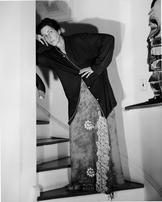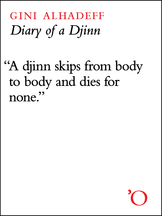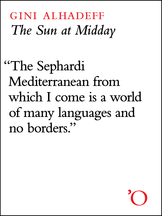Gini Alhadeff
Gini Alhadeff was born in Alexandria, Egypt, of Italian parents. After attending a French kindergarten in Khartoum, Alhadeff learned English in Tokyo, graduated from high school in Florence, Italy, and from art schools in London and New York. She is the author of a memoir, The Sun at Midday: Tales of a Mediterranean Family, and of a novel, Diary of a Djinn. She founded and edited two literary quarterlies, Normal, and XXIst Century! in the late 80's, and has since contributed regularly to Italian Elle, and to Travel + Leisure magazine; more recently also to the quarterlies Bidoun, The Drawbridge and to T Magazine. In 2004 she won Mexico's Pluma de Plata award for journalism. She edited and translated the first American anthology of Italian poet Patrizia Cavalli, My Poems Won’t Change the World (FSG 2013) and her translation of Fleur Jaeggy’s collection of stories, I Am the Brother of XX, will be published by New Directions in 2017.
Books By Gini Alhadeff
Diary of a Djinn
The all-knowing djinn of ancient lore can adopt many forms, but there are times when it chooses the limits of one body, one life. In this bewitching first novel, a djinn takes up residence in a restlessly brilliant woman, guiding her choices in life and love as she chases the satisfaction that eludes her—from a cloistered Florentine boarding school to the glamour of a Milan fashion house to a life beyond her means in 1990s Manhattan. She is as skilled at observing the worlds she moves through as her djinn is skilled at observing her, but an ever-growing self-awareness does not help her to realize her heart’s desires.
 |
The Sun at Midday
This astonishing memoir is the story of a family who always felt slightly foreign in every country and developed a chameleon-like ability to adapt to their surroundings. Gini Alhadeff was born in Alexandria, Egypt, and grew up in Cairo, Khartoum, Florence, and Tokyo. With a vivid gift for narrative, Alhadeff evokes the languid Alexandria of the early decades of this century (where her mother’s family made its fortune in cotton) and some of its beguiling honorary citizens: a violet-eyed aunt who refused to have new slipcovers made for her sofa so President Nasser would find the old ones when her house was impounded; a cousin who was taught the limits of reason by Wittgenstein at Cambridge and became a monsignor; a gynecologist uncle interned at Auschwitz and then Buchenwald, who lived to tell his tale with stark unsentimentality.
 |



